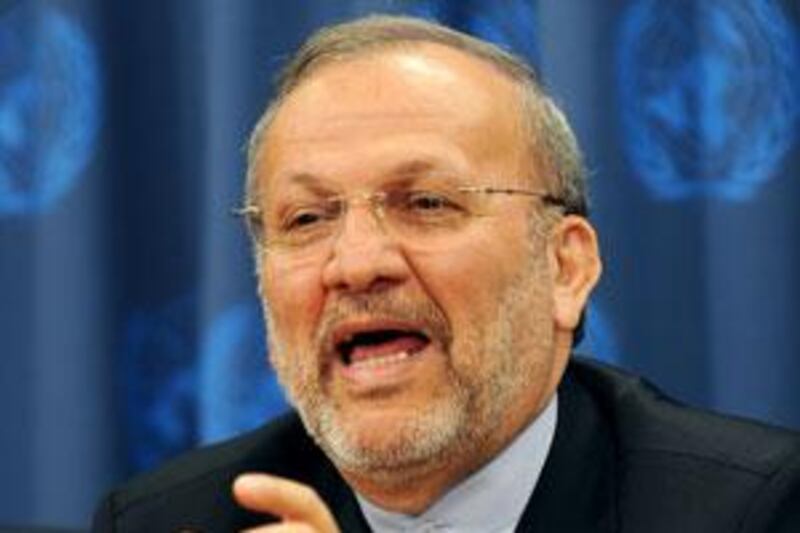The mysterious disappearance of an Iranian nuclear scientist in Saudi Arabia has prompted speculation that he defected and may have played a role in exposing the secret uranium enrichment plant near Qom. The murky case appears to have jangled nerves in Iran, which is keen to play down the damaging and embarrassing possibility that Shahram Amiri has sought political asylum in Saudi Arabia or defected to the West.
He vanished in June but word of his disappearance only emerged last week when Iran declared that it held the Saudi government responsible for his fate. On Wednesday, Iran's foreign minister, Manouchehr Mottaki, also accused the United States of involvement in his "arrest". Some Iranian commentators have used the word "kidnapping". If Mr Amiri has defected and proves to be a valuable asset for Western intelligence, it could weaken Iran's hand in nuclear negotiations, which opened in Geneva last week with unexpectedly productive results. Iran would risk further accusations of duplicity if it withholds information that Mr Amiri may have divulged already.
"It damages Iran's image to have people of such calibre defecting," said Meir Javedanfar, an Iranian-born analyst based in Israel and co-author of The Nuclear Sphinx of Tehran. "It also makes the people in charge [in Tehran] question their decisions with more suspicion and lack of confidence, especially after the recent exposure at Qom," he told The National. The Iranian Student News Agency (ISNA) reported "rumours" that Mr Amiri was an employee of Iran's Atomic Energy Organisation who wanted to seek asylum abroad. Meanwhile, Jahannews, a website connected to Iranian conservatives, claimed that he worked at the newly disclosed Fordu plant near Qom and had defected to Saudi Arabia. It provided no source for its assertions.
Mr Amiri's wife, who has not been named by Iranian media, said he was researching medical uses of nuclear technology at a university but was not involved in the broader nuclear programme. Mr Amiri is the second Iranian in a sensitive post to have disappeared abroad in recent years. In early 2007, Ali Reza Asghari, a former deputy defence minister and retired general in the elite Revolutionary Guards, vanished during a private visit to Turkey. Iran accused Western intelligence services of possibly kidnapping him. US media cited officials in Washington at the time saying that Mr Asghari's disappearance was voluntary and he was providing invaluable information on Iran's ties to Hizbollah.
Mr Amiri disappeared during a pilgrimage to Mecca after arriving in Saudi Arabia on May 31. According to ISNA, Mr Amiri's wife said he told her that on his arrival in the Kingdom he had been questioned extensively by police at the airport - "more than any other passenger". His wife said she has not heard from him since June 3 when he called her from the holy city of Medina. Like Turkey, Saudi Arabia is a strong US regional ally and both countries have voiced concern about Iran's nuclear ambitions.
Mr Amiri's relatives have demonstrated several times outside the Saudi embassy in Tehran demanding information. Iran says it has asked Saudi Arabia about his whereabouts but received no reply. Iran's state-run Press TV said Mr Amiri worked as a researcher at Tehran's Malek Ashtar University. The university has been cited by the UN in the past as a nuclear research site and is believed to be run by the Revolutionary Guards. According to the university's website, it is involved in the implementation of "special national research projects" and has faculties in aerospace, electrical engineering and other topics.
In a sign of how sensitive Iran regards the case, Iranian officials have been much more reticent about Mr Amiri's background than some of the country's media: they have not even publicly identified him as a nuclear scientist, referring to him only as an Iranian citizen or pilgrim. "We hold Saudi Arabia responsible for Shahram Amiri's situation and consider the US to be involved in his arrest," Mr Mottaki said on Wednesday. "According to some documents available to us, we consider that the US is responsible for his detention."
The US state department spokesman, Ian Kelly, said on the same day: "We just basically don't have any information on this individual." Mr Amiri disappeared nearly four months before the US, Britain and France revealed the existence of the hitherto covert Fordu uranium enrichment site being built beneath mountains near Qom. The timing has led analysts to question whether Mr Amiri may have given the West information on it or other parts of Iran's nuclear programme.
Western intelligence agencies have tracked the construction of the Fordu plant for more than two years. But Barack Obama said last month: "Earlier this year we developed information that gave us confidence that the facility was a uranium enrichment plant." Western officials have said their knowledge about the Fordu facility came mainly from spy satellites, technical data and human intelligence, but have not specified whether the last included Iranians on the ground.
Iran pledged at the weekend to allow inspectors from the UN's nuclear watchdog access to the newly disclosed plant on October 25. Mr Mottaki last month made a formal complaint to the UN secretary general, Ban Ki-moon about four missing Iranians who he contended were in US custody, among them Mr Amiri and Mr Asghari. Another was a young Iranian businessman, identified only as Ardebili, who was reportedly detained recently in Georgia. The Saudi newspaper, Asharq al-Awsat, reported that he may have been involved in buying military equipment.
Iranian officials say he was extradited to the US after his arrest. Mohammad Marandi, a professor at Tehran University, said Mr Amiri's "kidnapping" would damage any move towards rapprochement between Tehran and Washington. "It will raise questions as to whether the United States is truly willing to resolve these issues with Iran or whether it wishes to continue confrontations," he told Iran's Press TV. The academic also lashed out at Saudi Arabia: "The Saudi regime has effectively discredited itself" by "effectively abiding by American wishes".
mtheodoulou@thenational.ae





